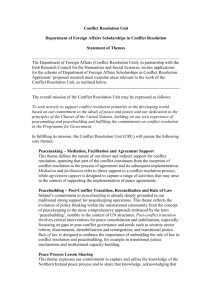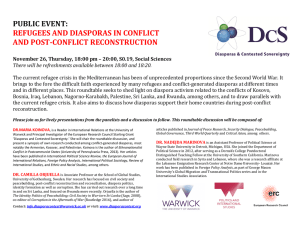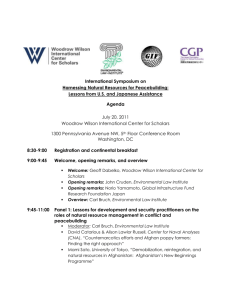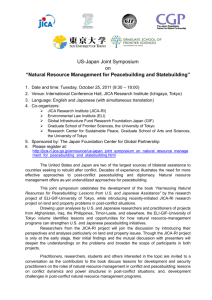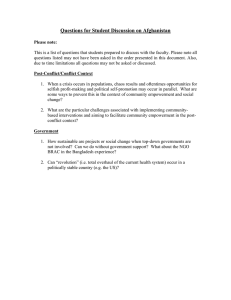Professional Certificate in Conflict Resolution and Post-Conflict Reconstruction
advertisement
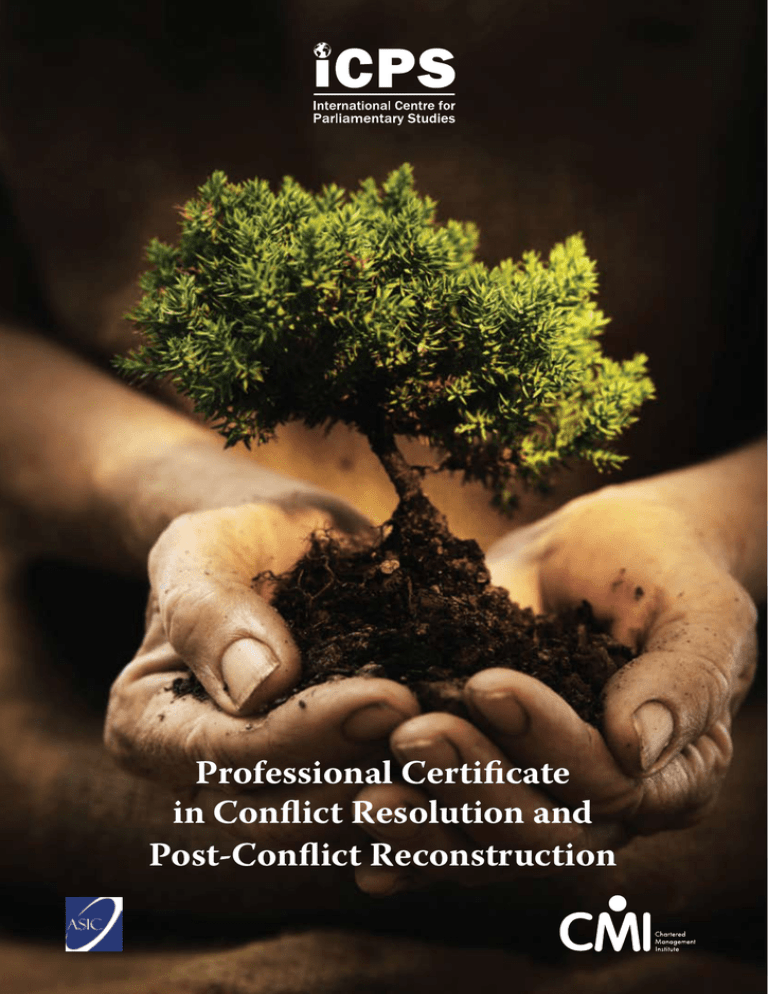
Professional Certificate in Conflict Resolution and Post-Conflict Reconstruction What is it? Professional Certificate in Conflict Resolution and Post-Conflict Reconstruction This is a specialist training course leading to a Level 5 CMI Certificate in Management and Leadership. Upon completion of this week-long course and subsequent written tasks, the successful candidate will be awarded a Level 5 CMI certificate in Management & Leadership showing the CMI units achieved. In addition, the successful candidate will receive a transcript from the International Centre for Parliamentary Studies certifying the specialisation in Conflict Resolution and Post-Conflict Reconstruction. It is designed specifically for those working in the field of conflict resolution throughout the world. This week-long certificated programme provides those who work in post-conflict situations with the knowledge and skills to re-establish societies and states in the wake of conflict. Leading to a professional qualification accredited by the CMI, the programme tackles the key issues in societies emerging from violent emergencies. Participants will consider problems including displaced peoples, gender, post-conflict democracy and governance deficits, rebuilding economies and the governance of post-conflict reconstruction. With a particular focus on understanding indigenous and local strategies to peace-building, this programme challenges participants to rethink accepted processes of reconstructing post-conflict societies. Participants will gain insight into the successes and failures of international peacebuilding projects and the latest research and ideas to confront the ongoing difficulties of post-conflict reconstruction. The course takes place in London, although we are also able to organise the course in your own country if this is your preference. It is internationally recognised and gives you highly sought after transferable CATS points. The Chartered Management Institute is the only chartered professional body in the UK dedicated to promoting the highest standards in management and leadership excellence. The professional qualifications offered by the Institute are internationally recognised and sought after. What level is it taught at? It is taught at CMI Level 5, which for comparison purposes equates to Bachelor’s Degree level and above. Who is it for? • • • • Any individual who wishes to develop their core professional capabilities and competencies in the fields of conflict resolution and post-conflict reconstruction Any individual who is seeking training specifically related to conflict resolution and post-conflict reconstruction that offers professional accreditation Any individual seeking to improve their skills and confidence in their chosen field of conflict resolution Anyone who would like to develop their career and improve their CV with an accredited qualification from the CMI How will my employer benefit? • • • • • • Value for money – investing in training that comes with professional recognition Return on investment – demonstrably better quality outcomes through an up-skilled workforce More proficient management and leadership within the organisation, with associated benefits of improved service delivery and greater productivity Improved morale of employees, leading to reduced staff turnover, greater stability, and less need to spend money on externally recruiting new managers and leaders. Skills you learn are immediately applicable in the workplace because of our tailor-made approach Quality assured – through the CMI’s tried and tested best practice management techniques What is involved? To obtain the Chartered Management Institute Professional Certificate in Management and Leadership you will complete the week-long training, followed by two written tasks to be completed by you after the duration of the course. Training and guidance are available from our tutors as part of the course to enable those who wish to be awarded the CMI certificate to complete their written work. For those who wish to benefit from the training but who do not wish to complete the written work for the CMI certificate, the International Centre for Parliamentary Studies is able to offer its own certificates of participation and attendance. How much does it cost? Certificate: £2950 + VAT if applicable. This covers all tuition, materials, assessments, and membership of the CMI from the beginning of the course until you complete your written tasks. Enquiries & bookings: +44 (0)20 3137 8641 • alun.lloydmorris@intl.parlicentre.org • http://www.conflict.parlicentre.org Professional Certificate in Conflict Resolution and Post-Conflict Reconstruction Management of Forced Migrants Introduction World Development Report 2011: Conflict, Security and Development Providing rights to forced migrants Understanding and supporting internally displaced peoples Findings and lessons of the World Development Report 2011 Understanding the importance of avoiding cycles of violence Strengthening institutions and rebuilding trust Involving Forced Migrants and Refugees in Peacebuilding Security Sector Reform Aid in Conflict Zones Producing effective and legitimate security services Re-establishing rule of law Establishing legitimate actors and recipients Supporting effective communication for distribution Controlling the Arms Trade Preventing a return to violence Regulation and monitoring Establishing Transitional Justice Mechanisms A means of promoting civic trust Addressing legacies of human rights abuses Case study: Security and Justice Empowering migrants for inclusive development The importance of including migrants in peacebuilding NGOs in Conflict Zones Establishing legitimate actors Supporting effective communication between agencies Case study: The Roles of Aid and NGOs FInal Questions and Discussion Final Questions and Discussion Women in Conflict Zones International Peacebuilding Strategies UN Security Council 1325 Involving women in peacebuilding Incorporating a gender perspective into peacekeeping operations Rethinking organisational structures of peacebuilding missions International efforts to consolidate peace Democratic Institutions as part of Post-Conflict Peacebuilding Establishing democratic institutions for social cohesion Understanding the problems of democracy in recently violent states Effective Governance Mechanisms Improving governance of new institutions Designing institutions which encourage good governance Building Civil Society and the Media Supporting local campaigning and media groups Establishing sectors for accountability Indigenous and Local Strategies to Peacebuilding Utilising pre-existing ideas about conflict resolution Avoiding ‘imposing’ resolutions Securing Economic Recovery Post-Violence Challenges to Peace Understanding the links between conflict and the economy Opportunities and traps in post-violence economies Disarmament, demobilisation and reintegration Finding a ‘place’ for armed actors Case study: Economic Reform in Post-Conflict Situations Case Studies: Post-Cold War UN and NATO-led Peacebuilding Strategies Final Questions and Discussion Final Questions and Discussion Structuring a written piece of work for assessment – Generic Overview and Principles Structuring these two specific pieces of work to demonstrate all the assessment criteria Blending regulatory content into these structures Final Questions and Discussion Professional Certificate in Conflict Resolution and Post-Conflict Reconstruction International Centre for Parliamentary Studies Unit N0001, Westminster Business Square 1-45 Durham St, London, SE11 5JH +44 (0) 020 3137 8640 conferences@parlicentre.eu participant fee fee (gbp) £2950 per participant participant details Participant Name Position Date Email Address 1. 2. 3. 4. 5. key contact details Name: Organisation: Department: Address: Telephone: Fax: Email: ___________________ ___________________ ___________________ ___________________ ___________________ ___________________ ___________________ invoice detailsnvoice details Name: Organisation: Department: Address: Telephone: Fax: Email: ___________________ ___________________ ___________________ ___________________ ___________________ ___________________ ___________________ Same as key contact details method of payment Please invoice my organisation for a total of __________ I enclose a cheque for ________payable to International Centre for Parliamentary Studies Ltd I will pay the sum of _________ by credit card. Please contact me to obtain my details. NOTE: UK customers are subject to VAT, charged at 20% terms and conditions Invoices are dispatched immediately upon receipt of a valid registration form, and payment must be made within 30 days of receipt of the invoice. If a registration form is submitted less than 30 days before the start of the event, payment must be made immediately upon receipt of an invoice from ICPS. Failure to adhere to these payment terms may result in ICPS cancelling your place on the course. Cancellations will be accepted in writing no later than 30 days prior to the date of the event and are subject to an administrative fee equal to 25% of the applicable per-delegate rate and charged per cancelled delegate place. Cancellations received within 30 days of the event will be subject to the full delegate fee, which will also be charged in the event of non-attendance. Notwithstanding, delegate substitutions may be issued in writing at any time and will not be subject to any charge. Signed: _____________________________ please email back to Date: ______________________________ bookings@parlicentre.eu or fax back to +44 (0) 845 606 1539
